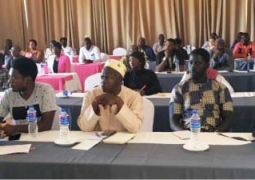The 2010 Global Week of Action on Education, an annual event promoted by the Global Campaign for Education (GCE) and implemented in more than one hundred countries, is focusing on Financing Quality Public Education this year.
In The Gambia, the event is being organised by the Education for All Campaign Network (EFANet).
The planned activities for the week of action, according to a statement from the EFANet, will take place from 19th - 25th April in 23
villages across the country.
Every year during Global Action Week, the EFANet make specific demands to call on leaders all over the world to make good on their promises on education. This year the campaign is linked with the FIFA World Cup and aims to use the appeal of football as a platform to raise the urgency for the fulfillment of EFA goals by 2015.
Since April 2002, EFA Network, in collaboration with its partners and members has successfully celebrated the GAW as an annual commemoration of the 2000 Dakar Declaration to remind world leaders of the pledge made to promote and fulfill the basic right to education.
2010 is a special year because of the 1GOAL: Education for All Campaign. This is a campaign that has been launched to coincide with the FIFA World Cup in South Africa as this will capture the attention of billions of fans around the world and it is for the first time taking place on the African continent.
"We know that Africa has the largest percentage out-of-school children in the world and it is against this we are calling on world leaders to act so that everyone can get an education. Our main aim is to ensure that we have millions of people calling for the fulfillment of the Education for All goals.
“World leaders have the power, the resources, and the knowledge to achieve education for all. 1GOAL will be asking all leaders to make Education for All a reality," the statement added.
It called on governments around the world to spend 20% of the national budget on education with at least half of this being on primary education, make it possible for everyone to be able to get a free quality primary education, and not be punished for being poor, provide enough trained teachers to inspire and teach children in classes no bigger than 45 and offer benefits to poorer families, such as free school meals, to help them keep children, especially girls out of work and in school.



